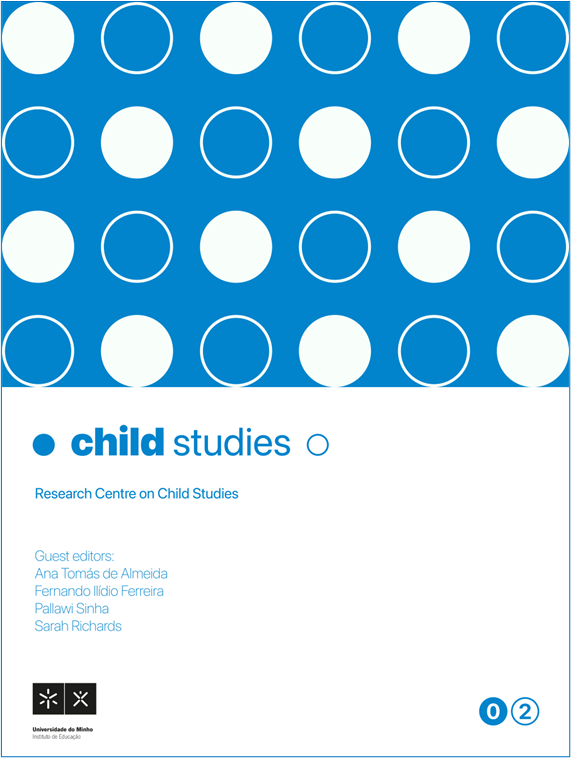Challenges on implementing a screening system with ages and stages questionnaires (ASQ-PT) in Portugal
DOI:
https://doi.org/10.21814/childstudies.4537Keywords:
Ages and Stages Questionnaires, development screening, professionals/families collaborationAbstract
Ages and Stages Questionnaires (ASQ-PT) is a screening instrument that has already been standardized and adapted to Portuguese child population. We conducted a study to understand professionals and parents perceptions on the use of Ages and Stages Questionnaires (ASQ-PT). Families and professionals (early intervention, health and education) from three geographical areas of Portugal (North, Center and Lisbon and Tagus Valley) used this instrument to screen children. After we analyze the screening system implemented and the collected data, a set of key words allowed us to reflect on the practical implications of screening and the ASQ system: Motivation; Collaboration; Trust; Knowledge/empowerment; Coordination; Dissemination; Training. Results of this qualitative study are presented with suggestions on enhancing ASQ-PT uses.
References
Alves, A. P., Monteiro, I., Silva, P., Santos, P. (2018). Relatório de Atividade – Avaliação do Funcionamento do SNIPI- 2017. Comissão de Coordenação do SNIPI.
American Academy of Pediatrics (2001). Committee on Children with Disabilities. Policy Statement: Developmental Surveillance and Screening of Infants and Young Children. Pediatrics, 108, 192-196. http://doi.org/10.1542/peds.108.1.1922
Bricker, D. (1996). Assessment for IFSP development and intervention planning. In S. J. Meisels, & E. Fenichel (Eds), New visions for the developmental assessment of infants and young children (pp. 169-192). Zero to Three: The National Center for Infants, Toddlers, and Families.
Bricker, D., Allen, D., Clifford, J., Pretti-Frontczak, K., Slentz, K., & Squires, J. (2008). The Relationship Between the Ages & Stages Questionnaires (ASQ) and the Assessment, Evaluation, and Programming System for Infants and Children (AEPS). Early Intervention Management and Research Group, White Paper n. 1.
Bricker, D., Squires, J., & Potter, L. (1997). Revision of a parent-completed development screening tool: Ages and Stages Questionnaires. Journal of Pediatric Psychology, 22, 313-328. http://doi.org/10.1093/jpepsy/22.3.3133
Bricker, D., Macy, M., Squires, J., & Marks, K. (2013). Developmental Screening in Your Community: An Integrated Approach for Connecting Children with Services. Paul H. Brookes Publishing, Co.
Carvalho, L., Almeida, I. C., Felgueiras, I., Leitão, S., Boavida, J., Santos, P. C., Serrano, A., Brito, A. T., Lança, C., Pimentel, J. S., Pinto, A. I., Grande, C., Brandão, T., & Franco, V. (2016). Práticas Recomendadas em Intervenção Precoce na Infância: Um Guia para Profissionais (1.ª ed.). Associação Nacional de Intervenção Precoce.
Castro, S., & Gomes, I. (2000). Dificuldades de Aprendizagem da Língua Materna. Universidade Aberta.
Decreto-Lei n.º 281/2009, de 6 de outubro (2009). Diário da República – 1.ª Série, n.º 193, 7298-7301.
Della Barba, P. C. S., Mazak, M. S. R., Miyamoto, E. E., & Ramos, M. M. A. (2018). O Ages and Stages Questionnaires (ASQ-BR) e ações colaborativas entre pais e educadores. Temas em Educação e Saúde, v. 14, n.º 1, jan-jul, 31-40. https://doi.org/10.26673/rtes.v14. n1.2018.10581
Direção-Geral de Saúde (2013). Saúde Infantil e Juvenil: Programa Nacional. Direção-Geral da Saúde. http://www.dgs.pt/documentos-e-publicacoes/programa-tipo-de-atuacao-em-saude-infantil-e-juvenil.aspx
Division for Early Childhood (2007). Promoting positive outcomes for children with disabilities: Recommendations for curriculum, assessment, and program evaluation. Division for Early Childhood.
Division for Early Childhood. (2014). DEC recommended practices in early intervention/early childhood special education 2014. http://www.dec-sped.org/recommendedpractices.
Dunst, C. J. (2017). Family systems early childhood intervention. In H. Sukkar, C. J. Dunst, & J. Kirkby (Eds.), Early Childhood Intervention: Working with Families of Young Children with Special Needs (pp. 36-58). Routledge.
Dworkin, P. H. (1989). Developmental screening – Expecting the impossible? Pediatrics, 83(4), 619-622.
Germano, C. M. G. (2011). Processos de identificação e sinalização de crianças com problemas na linguagem oral pelos educadores de infância. [Master’s Thesis, Escola Superior de Educação de Lisboa]. Repositório Institucional do Instituto Politécnico de Lisboa. http://hdl.handle.net/10400.21/1394
Glascoe, F. P. (2000). Evidence-based approach to developmental and behavioral surveillance using parents’ concerns. Child Care Health Development, volume 26(2), 137-149. http://doi.org/10.1046/j.1365-2214.2000.00173.x
Glascoe, F. P. (2005). Screening for Developmental and Behavioral Problems. Mental Retardation and Developmental Disabilities Research Reviews, 11, 173-179. http://doi.org/10.1002/mrdd.20068
Graça, P. (2013). Aferição para a população portuguesa da Escala de Desenvolvimento: Ages & Stages Questionnaires (ASQ3) dos 30 aos 60 meses. [Doctoral Dissertation, Universidade do Minho]. Repositório Institucional da Universidade do Minho. https://hdl.handle.net/1822/25609
Lopes, S. (2013). Aferição para a população portuguesa da Escala de Desenvolvimento: Ages & Stages Questionnaires (ASQ3) dos 2 aos 12 meses. [Doctoral Dissertation, Universidade do Minho]. Repositório Institucional da Universidade do Minho. https://hdl.handle.net/1822/27384
Meisels, S. J. (1989). Can Developmental Screening Tests Identify Children Who Are Developmentally at Risk? Pediatrics, 83(4), 578-585.
Meisels, S. J., & Atkins-Burnett, S. (1999). Assessing intellectual and affective development before age three: A perspective on changing practices. Food and Nutrition Bulletin, 20(1), 23-33.
Meisels, S. J., & Atkins-Burnett, S. (2008). Evaluating Early Childhood Assessments. In K. MacCartney, & D. Phillips, Blackwell Handbook of Early Childhood Development (pp. 533-549). Blackwell Publishing, Ltd.
Oliveira, G. (2017). Neurodesenvolvimento e comportamento. In G. Oliveira, & J. Saraiva (Coord.), Lições de Pediatria. Volume I (pp. 212-232). Imprensa da Universidade de Coimbra. http://doi.org/10.14195/978-989-26-1300-0
Pinto, M. (2009). Vigilância do desenvolvimento psicomotor e sinais de alarme. Revista Portuguesa de Clínica Geral, 25, 677-687. http://dx.doi.org/10.32385/rpmgf.v25i6.10694
Sameroff, A. J., & Fiese, B. H. (2000). Transactional regulation: The developmental ecology of early intervention. In J. P. Shonkoff, & S. J. Meisels (Eds.), Handbook of early childhood intervention (2nd Ed., pp. 135-159). Cambridge University Press.
Squires, J., Twombly, E., Bricker, D., & Potter, L. (2009). ASQ-3 User's Guide. Paul H. Brookes Publishing Co.
Teixeira, S. (2013). Aferição para a população portuguesa da Escala de Desenvolvimento: Ages & Stages Questionnaires (ASQ3) dos 14 aos 27 meses. [Doctoral Dissertation, Universidade do Minho]. Repositório Institucional da Universidade do Minho. https://hdl.handle.net/1822/25573
Downloads
Published
How to Cite
Issue
Section
License
Copyright (c) 2023 Rita Laranjeira, Ana Maria Serrano

This work is licensed under a Creative Commons Attribution-NonCommercial 4.0 International License.



